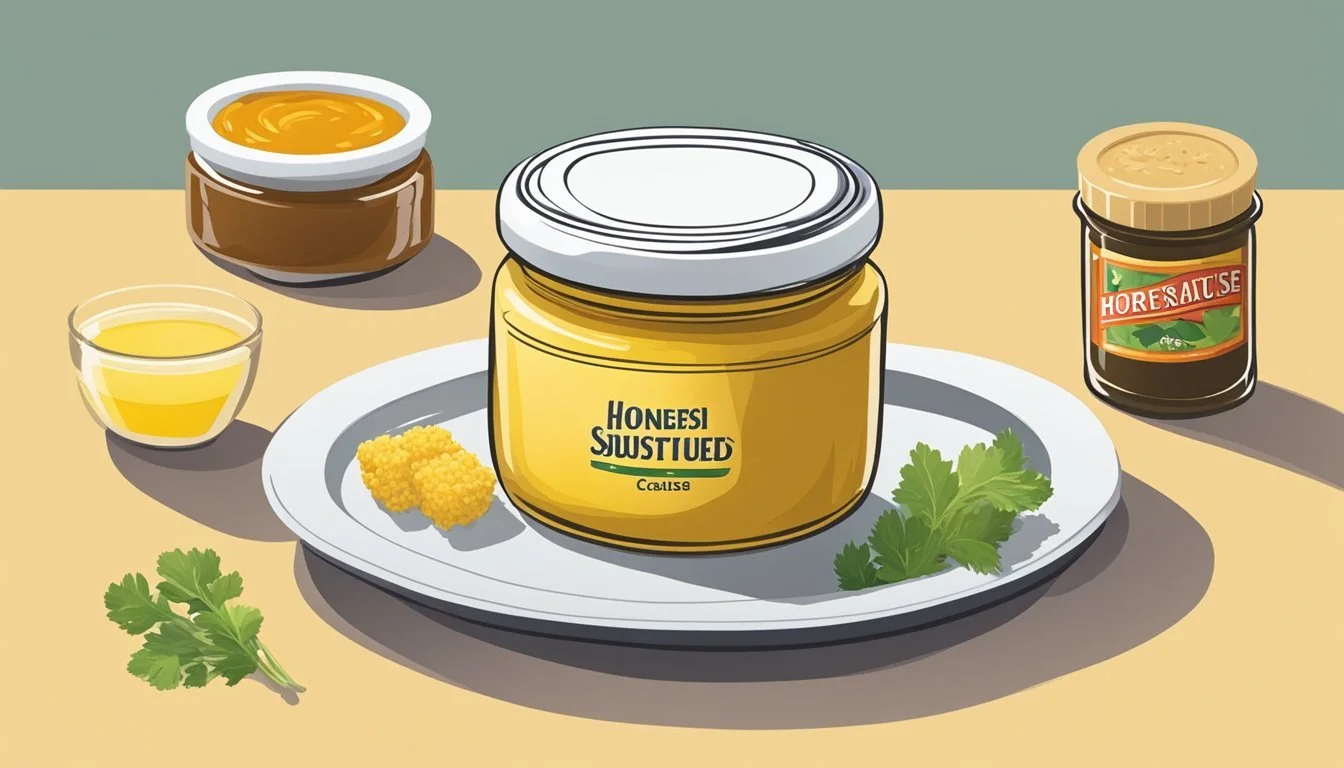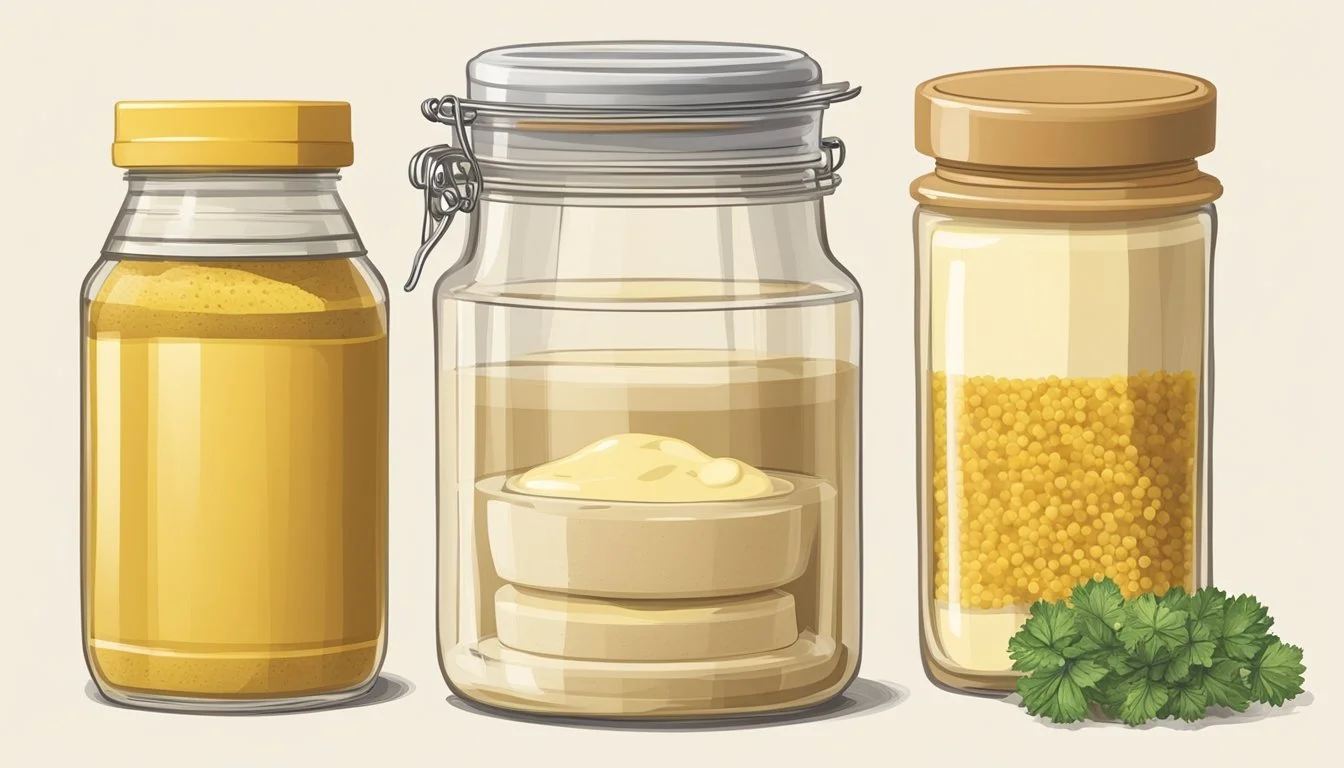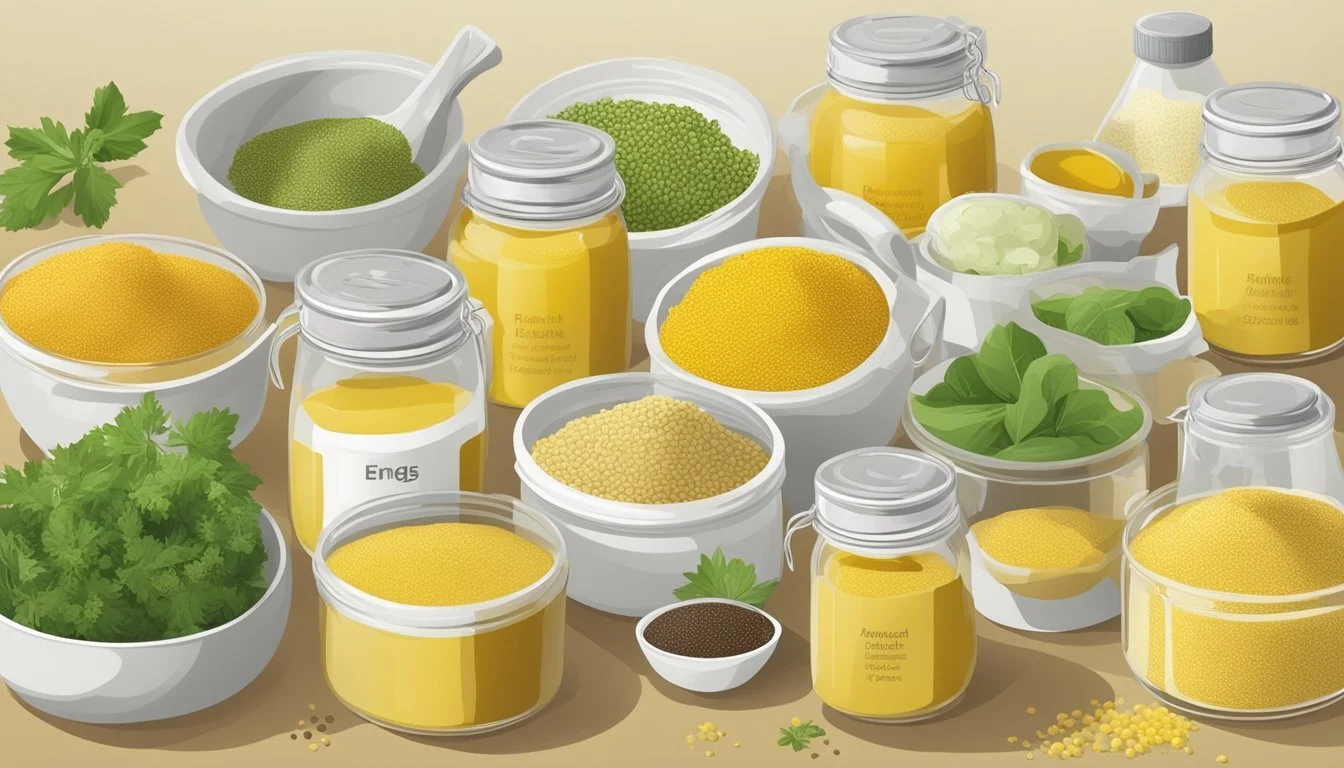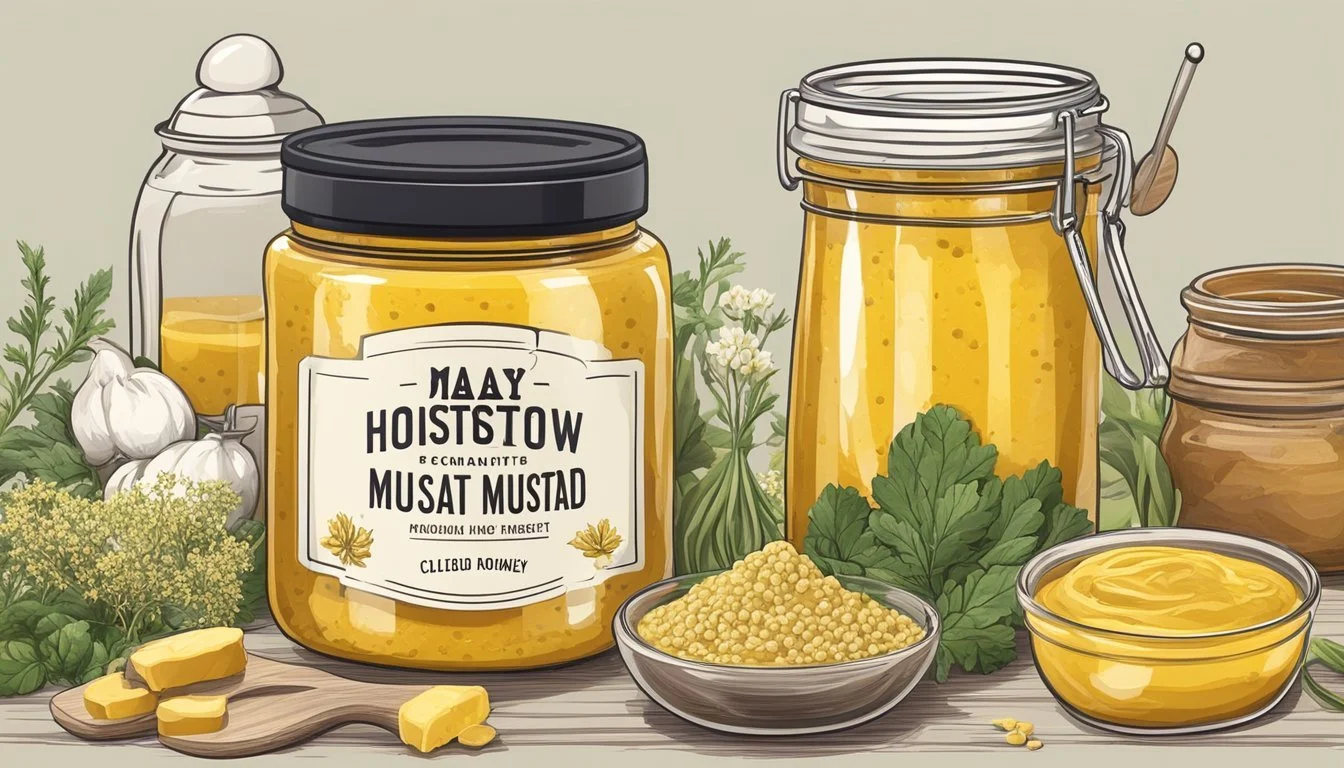English Mustard Substitutes
Top Alternatives for Your Recipes
English mustard is a distinctive condiment, known for its bold and robust flavor that can add a sharp kick to a variety of dishes. It is characterized by its bright yellow color and typically pungent, spicy taste, thanks to the use of ground mustard seeds, turmeric, and other spices in its preparation. The precise flavor of English mustard has made it a staple in British cuisine, highly regarded for its ability to enhance the flavors of sandwiches, roasts, and various sauces.
Despite its popularity, there may be occasions when English mustard is unavailable or when a recipe calls for a milder alternative. In such cases, cooks can turn to several suitable mustard substitutes that do an excellent job of mimicking or complementing the flavor profile of the original condiment. The most common substitutes include Dijon mustard for its smooth consistency and tangy taste, whole grain mustard for a coarser texture, and other regional varieties like German mustard, which offer a milder flavor with a different spice blend well-suited to accompanying meats and sausages. Each substitute offers its unique twist to dishes, allowing for culinary creativity and personal preference to guide the choice of condiment.
Understanding English Mustard
English mustard is a traditional condiment known for its bright yellow color, distinctive taste, and versatility in various dishes.
Key Ingredients
In its classic form, English mustard is a combination of ground mustard seeds, flour, turmeric, salt, spices, and water or vinegar. The seeds used are often a mix of white (yellow) and brown or black varieties, which contribute to its robust flavor and intense heat.
Characteristics and Flavor Profile
English mustard has a notably sharp, spicy, and slightly bitter flavor, with a creamy yet granular texture. The vibrant yellow color is a result of turmeric, a common ingredient. Its spiciness comes from mustard powder which is activated by the addition of water, releasing pungent compounds.
Culinary Uses
Highly versatile, English mustard serves as a condiment, dressing, and an ingredient in marinades. Commonly paired with meats such as roasts and sausages, it is also found in sandwiches, potato salads, and used to create complex flavors in cooked dishes.
Popular Mustard Substitutes
When seeking alternatives to English mustard, it's crucial to select a substitute that aligns with the desired flavor profile and texture. The following substitutes offer a range of tastes from mild to sharp and provide distinct textures suitable for various dishes.
Dijon Mustard
Dijon mustard, made from brown mustard seeds and white wine, closely resembles the sharpness of English mustard but with a slightly more acidic edge. It's an excellent substitute in vinaigrettes and marinades, where it imparts a robust flavor without overpowering other ingredients.
Yellow Mustard
Yellow mustard, known for its mild taste and bright color due to turmeric, is a staple in many kitchens. It's less spicy than English mustard and is commonly used in salad dressings and as a condiment for sandwiches and hot dogs.
Honey Mustard
Honey mustard combines the sweetness of honey with the tang of mustard, creating a sweet and slightly tart condiment. It's ideal for salad dressings and dipping sauces, offering a milder heat compared to English mustard, which pairs well with a variety of foods.
Whole Grain Mustard
Whole grain mustard is known for its coarse texture, featuring partially crushed mustard seeds. This substitute adds a visually appealing speckle to dishes and offers a milder flavor that works well in robust meat dishes and dressings.
Horseradish or Horseradish Sauce
Horseradish and horseradish sauce bring a fiery, pungent heat similar to that of English mustard. Extracted from the root of the plant, horseradish can be grated fresh or mixed into a sauce and used sparingly to mimic the heat profile of English mustard in recipes.
Homemade Substitutes for English Mustard
When the distinctive taste of English mustard is desired but unavailable, homemade solutions using various mustard seeds and common pantry ingredients can effectively mimic its bold, sharp flavor.
Combining Other Mustard Types
To substitute English mustard, one can mix different commercially available mustards. American yellow mustard, milder and less pungent, can be fortified with more potent spicy brown mustard. A suggested ratio is one tablespoon of yellow mustard to one teaspoon of brown mustard. This combination balances tanginess and heat.
Creating a Custom Blend
A homemade English mustard blend starts with brown mustard seeds and black mustard seeds, ground into powder. Combine equal parts of this powder with flour to help thicken and sugar for a hint of sweetness. Gradually add water and vinegar, while constantly stirring until desired consistency and pungency are reached. Add a pinch of salt and other spices as per taste preference.
Using Dry Mustard
Dry mustard, also known as mustard powder, serves as a direct base for a homemade substitute. Blend one tablespoon of dry mustard with two teaspoons of water to form a paste. For complexity and tang, add a small amount of vinegar. To further align with English mustard's profile, a sprinkle of sugar and salt can be incorporated. Let the mixture sit for a few minutes to allow the flavors to develop.
Non-Mustard Alternatives
For those wanting to replicate the bold heat of English mustard without using mustard itself, there are several zesty non-mustard alternatives that serve as excellent substitutes in various dishes, offering comparable warmth and pungency.
Wasabi and Other Spicy Substitutes
Wasabi, a staple in Japanese cuisine, is directly related to the mustard family, making it an appropriate substitute for English mustard. Its fiery nature can deliver a similar sinus-clearing heat, although it should be used sparingly due to its intensity. When using wasabi, start with small amounts and adjust according to the desired level of heat and flavor.
Substitution ratio: Use approximately half the amount of wasabi when substituting for English mustard to maintain a balanced heat profile.
Using Heat Sources Like Hot Sauce
For a liquid alternative that packs heat, hot sauce can be a viable option. Made from chili peppers, vinegar, and spices, hot sauces vary in flavor and intensity.
Substitution ratio: To mimic the sharpness and warmth of English mustard, begin with a few drops of hot sauce and adjust to taste.
Hot sauces, due to their high vinegar content, can introduce both heat and acidity to dishes, much like English mustard. They're best used in liquid-based recipes where their consistency can be easily integrated.
Key considerations: Opt for hot sauces that don't overpower with additional flavors when looking for an English mustard substitute in savory dishes.
Nutritional and Health Considerations
When considering substitutes for English mustard, it's important to evaluate both the nutritional content of mustard seeds and how alternative ingredients compare in terms of health benefits and nutritional value.
Mustard Seeds Nutrition
Mustard seeds are the primary ingredient in English mustard. They are a good source of several nutrients, including antioxidants, selenium, magnesium, and omega-3 fatty acids. Furthermore, mustard seeds offer a range of vitamins such as Vitamin E and some B-complex vitamins.
Key Nutritional Highlights of Mustard Seeds (per tablespoon, ground):
Calories: Approximately 32
Protein: 1.83 g
Fat: 2.1 g
Carbohydrates: 2 g
Fiber: 1.08 g
Sodium: Minimal
Mustard seeds’ health benefits include anti-inflammatory properties and the potential to relieve muscle pain, thanks to the presence of compounds like sinigrin. They are also low in calories, which is beneficial for those monitoring their caloric intake.
Comparing Substitutes
When comparing substitutes for English mustard, one should consider ingredients like Dijon mustard, whole grain mustard, or white vinegar in terms of their nutritional value and health benefits.
Dijon Mustard:
Lower in sodium than most table mustards
Contains similar compounds as English mustard, including antioxidants
Fewer calories per serving compared to some condiments
Whole Grain Mustard:
Comparable in antioxidants and nutrients since it contains whole mustard seeds
Like English mustard, it's typically low in calories and fat, although its coarse texture can alter the amount used
White Vinegar:
Very low in calories and contains no fat
Lacks the antioxidants found in mustard seeds
Often used for its acidity rather than nutritional content
In general, mustard substitutes can offer a similar nutritional profile if they're mustard-based, due to shared ingredients. Non-mustard substitutes like white vinegar will lack specific health benefits like antioxidants but may cater to the needs of those with lower calorie or sodium requirements. When choosing a substitute, one should consider individual dietary needs and the desired nutritional benefits.
Frequently Asked Questions
This section addresses common inquiries regarding alternatives for those with mustard allergies, how to substitute different condiments in recipes, and the best practices for preserving the shelf life and storage of mustard substitutes.
Mustard Allergy Alternatives
For individuals with mustard allergies, finding suitable condiments to replace English mustard is crucial. They may consider horseradish or wasabi as these belong to the same botanical family and provide a similar heat, but they should be used with caution due to possible cross-reactivity. Sunflower seed butter is a safe, non-spicy alternative that offers a different but pleasant taste profile.
Substitutes in Cooking and Baking
When cooking or baking, different substitutes for English mustard can be employed, depending on the desired flavor and texture:
Dijon Mustard: Offers a milder heat and can be used in a 1:1 ratio.
Whole Grain Mustard: Has a coarser texture, so one may need to use double the amount to match the potency.
Turmeric: While not spicy, it gives color and a slight earthiness to recipes.
For precise flavor matching, it's essential to adjust quantities to personal taste.
Shelf Life and Storage
The shelf life and storage of English mustard substitutes vary:
Unopened condiments typically have a long shelf life and can be kept in a cool, dark place.
Once opened, condiments like Dijon or whole grain mustard should be refrigerated and typically remain fresh for up to one year.
Homemade substitutes should be stored in an airtight container and refrigerated, usually for no more than one to two weeks for optimal freshness.








